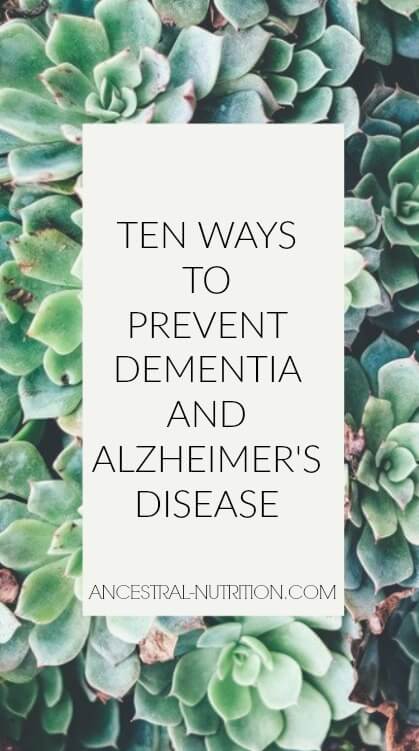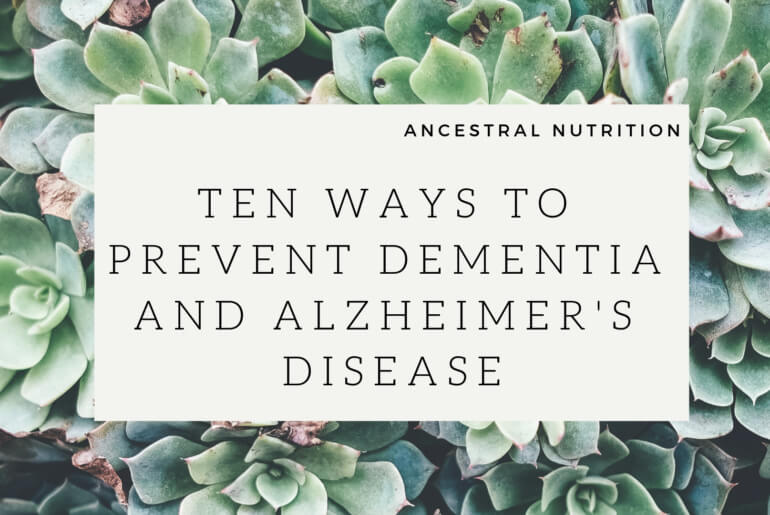Let me share a shocking statistic with you: 50% of people aged 85 and over will develop dementia or Alzheimer’s disease and there’s no cure for it. Prevention is the most impactful way to avoid developing these diseases. In fact, prevention is the best way to avoid developing not just these diseases, but all diseases in general. There are several steps we can take to ensure our life-long health. This is incredibly close to my heart so I want to share ten ways to prevent dementia and Alzheimer’s.
My happiest memory growing up was sitting on the floor of my grandmother’s apartment on a sunny day watching TV as she made food in the kitchen. Her apartment was the only place I felt safe and at ease and like I could just be myself. This was before she moved in with us, and her home was my respite. It was my cocoon of safety and childhood.
I was raised by my grandmother, Anna. She is caring, she is kind, she is funny – and she has dementia. She was 62 when I was born and I can never remember a time when she was not in cognitive decline. She couldn’t help me with my homework. She couldn’t do basic math. She often called me by my mother’s name. Growing up in the 90s and early 2000s, there wasn’t nearly as much information on prevention as there is now.

I miss my grandmother. I miss gossiping with her and going to Panera for lunch. I miss her cursing and insisting she never, ever used foul language. She is some of the only family I have and it breaks my heart when she calls me everyday crying because she doesn’t understand where she is; she wants to go home to live with her mom in Pennsylvania. Dementia is a brutal, heartbreaking, terrifying disease. We need to focus on prevention, because there is no prescription drug that can even moderately improve dementia or Alzheimer’s. It doesn’t exist.
Many people assume that dementia and Alzheimer’s disease are genetic, and while a genetic component has been isolated – whether or not a person develops dementia or Alzheimer’s has much more to do with lifestyle factors than genetic vulnerability.
I’ve been studying Alzheimer’s and cognitive decline for close to eight years; since I found out why husband is genetically susceptible (he is ApoE4/Apoe4, we will get more into this later). Genetically speaking, these people are at highest risk of developing some form of cognitive decline. Does this mean everyone who is E4/E4 will develop dementia? No. It just means they are at higher risk and have to take additional steps to prevent cognitive decline.
In all of my research, and there’s been a lot, these are the ten most important ways to prevent dementia and Alzheimer’s disease.
EAT A HEALTHY, LOW CARBOHYDRATE DIET
Consider this – like any organ in your body, your brain needs to be fed. Your brain needs more nutrients than any other organ. To function properly, it needs omega-3s, magnesium, vitamin D, B12 and so much more. If your diet is nutrient poor, so is your brain. If you are not eating a well rounded diet rich in vitamins, minerals and healthy fats, you may experience anxiety, depression, brain fog, memory loss, etc.
I’d first like to address the “healthy” part of eating a healthy diet. So many people are confused about what constitutes a healthy diet. The simple answer is this: whole foods, foods without ingredient labels. Vegetables, proteins, nuts, seeds and fruits.
More specifically, the base of your diet should be vegetables like leafy greens like kale and collards, broccoli, cauliflower, onions, garlic, artichokes, etc. The more variety, the better.
Next, you want healthy fat. Healthy fats like olive oil, grass-fed butter or ghee, avocado oil, duck fat, lard, etc. You may have heard negative things about fats like lard because of the saturated fat content, but did you know that your brain is over 60% saturated fat? Did you know that your cell membranes are made up of saturated fat? Or that your hormones are driven by fat? Saturated fat has been wrongly vilified my friends. Without it, your brain would be scrambled eggs.
Dementia and Alzheimer’s are often referred to as type 3 diabetes. This is because high blood sugar and insulin are some of the biggest factors in the development of cognitive decline. Foods that spike blood sugar include sugar itself, high sugar foods like honey and maple syrup, beer, processed food and grains. High blood sugar negatively impacts brain health. And unless you’ve been living under a rock, you’ve likely heard of the ketogenic diet.
The ketogenic diet is a very low carbohydrate diet that shows promising results for dementia and Alzheimer’s (as well as for epilepsy, anxiety and depression). With a ketogenic diet, the brain instead relies on ketones for fuel as opposed to glucose (sugar). When the brain relies on ketones, there is evidence that is simply functions better.
In a small sample study performed by researchers at the University of Kansas showed that 9 out of 10 participants who switched to a ketogenic diet saw significant improvement (source). One reason is that those with cognitive decline cannot effectively use glucose as fuel for their brains. And get this, when participants returned to their previous diets, improvements in cognitive test scores disappeared!
One of my favorite books on using the ketogenic diet to prevent and even reverse cognitive decline is The End of Alzheimer’s. In it, Dr. Bredesen details the benefits of a low carbohydrate diet, how to incorporate it into your life, helpful supplements to improve cognitive function and exercise and meditation tips. It is incredibly helpful for anyone experiencing cognitive decline or for those of us with a family member going through it.
A wide variety of evidence suggests that the ketogenic diet could have beneficial disease-modifying effects in epilepsy and also in a broad range of neurological disorders characterized by death of neurons. ..It has long been recognized that the ketogenic diet is associated with increased circulating levels of ketone bodies, which represent a more efficient fuel in the brain, and there may also be increased numbers of brain mitochondria. ..Additionally, biochemical changes induced by the diet – including the ketosis, high serum fat levels, and low serum glucose levels – could contribute to protection against neuronal death by apoptosis and necrosis through a multitude of additional mechanisms, including antioxidant and antiinflammatory actions. Source
EXERCISE REGULARLY
Exercise is probably the one thing everyone can agree on across the board. Exercise is crucial not just for our physical health, but equally as important for our mental health as well. Rigorous physical activity (you want to be breathing heavily) increases oxygen and blood flow to the brain, helps clear out plagues, increases the size of the hippocampus, stimulates brain cell growth and prevents cell death.
Meta-analyses of prospective studies documented a significantly reduced risk of dementia associated with midlife exercise; similarly, midlife exercise significantly reduced later risks of mild cognitive impairment in several studies. Among patients with dementia or mild cognitive impairment, randomized controlled trials (RCTs) documented better cognitive scores after 6 to 12 months of exercise compared with sedentary controls. Meta-analyses of RCTs of aerobic exercise in healthy adults were also associated with significantly improved cognitive scores. One year of aerobic exercise in a large RCT of seniors was associated with significantly larger hippocampal volumes and better spatial memory; other RCTs in seniors documented attenuation of age-related gray matter volume loss with aerobic exercise. Source
MIND GAMES
When my grandmother moved out of her apartment and into a group home where her clothes were laundered, her food was cooked for her and she didn’t have to do any errands, grocery shop, go to doctor’s appointments or otherwise actually use her brain – her cognition took a nosedive. This was when her dementia really became noticeable and steadily declined since.
One of the best ways to prevent cognitive decline is to strengthen cognitive skills! The old addage, if you don’t use it, you lose it – really applies here.
This is why reading, writing, playing games that stimulate cognition, doing things for yourself, planning, etc. all help prevent dementia and AD. They stimulate the brain!
Website and apps like Lumosity have games specifically designed to improve congition. Crossword puzzles, word problems and Scrabble are all great options! And don’t forget to keep as independent as possible as you age. You want to be cooking for yourself, clothe shopping, grocery shopping, going to the bank, keeping up with doctors appointments, etc.
SLEEP SOUNDLY
Sleep is crucial to keep any brain properly functioning. While we sleep, the brain resets itself, clearing out plaques and forming new brain cells. A hallmark trait of AD is plaque formulation, which makes sleep incredibly important, especially for those at risk.
Keep in mind that sleep isn’t just good for preventing dementia and AD. A poor night of sleep can lead to increased feelings of depression and anxiety, and that’s after a night of poor sleep. Extended sleep deprivation can lead to adrenal fatigue, mood disorders, cognitive impairment and other hormonal issues.
Sleep is crucial to physical and mental health. One study found that,
The study found that people who took longer than the typical 90 minutes to enter REM were more likely to get dementia. They also spent only about 17% of their sleep dreaming, compared to 20% in those who did not develop dementia. Source
Aim for eight hours of uninterrupted sleep each night.
FIND YOUR PURPOSE
While there isn’t much scientific information on this one, it’s a crucial part of a healthy lifestyle that I think holds a lot of merit. Finding your purpose is something I hear Dr. Mark Hyman, probably my favorite functional medicine doctor, talk about a lot.
We each have a purpose in life and it’s important that we find and practice it. When those with dementia feel that they have no purpose, or anyone really, this can lead to feelings of depression and isolation. We each have something to offer, whether it’s teaching or helping or whatever unique gift that each of us has. By finding your purpose and practicing it throughout life, you are actively using your brain and promoting those feel good hormones and neurotransmitters.
SOCIALIZE
Socializing is a huge preventative not just in terms of dementia and Alzheimer’s disease, but in the prevention of all disease. Socializing and being part of a community not only stimulates the brain, it wards off depression and anxiety as well. Numerous studies have demonstrated that having a strong social network prevents cognitive impairment.
This is something functional medicine focuses on, fostering a community and socializing. There are some studies that draw similarities between loneliness and isolation to smoking! It’s so important to have friends and family and spend quality time with them. You don’t need a lot of friends, but it’s crucial to have a few close ones you can confide in and interact with regularly.
STRESS LESS
Stress is a driver of every disease, not just dementia and AD. But it’s particularly detrimental when it comes to neurodegenerative diseases. One reason is because stress activates the hypothalamic-pituitary-adrenal (HPA) axis which elevates cortisol, a stress hormone. Elevated levels of cortisol have been linked to cognitive decline. This in part is due to increase plaque formation that is produced from the stress response.
In fact, one study found that dementia was 65% higher in women who reported significant periods of stress in middle age. Stress doesn’t just affect the brain, it also affects the immune system, the microbiome, gut health overall, energy levels and so much more.
Reducing stress is something everyone should get on board with to prevent disease overall and simply live a happy life. Great ways to do this are included in this list, including finding your life’s purpose, spending time in nature, sleeping well, meditating, etc.
SPEND TIME IN NATURE
There are three big reasons I include this on the list – the first is that spending time in nature reduces stress and reducing stress reduces developing disease overall. The second is that spending time in nature helps regulate your circadian rhythm, which promotes better sleep. Less stress and better sleep are amazing for brain health!
The third reason is that spending time in nature, particularly in the sun, increases vitamin D in the body. One study found that participants who were severely vitamin D deficient were twice and like to develop dementia and Alzheimer’s.
Participants who were only mildly deficient had an increased risk of 53%, while those who were severely deficient had a 125% increased risk of developing dementia. Source
In addition to soaking up all that vitamin D from the sun, there’s something to be said for connecting with the earth everyday. Adequate sunlight improves sleep and reduces stress, but being in the beauty of nature is simply good for the soul.
GET TESTED FOR APOE4
Apolipoproteins are proteins in the body that metabolize fats. You can be ApoE2, ApoE3 or ApoE4. You get one from your mom and one from your dad, so you can have numerous combinations. I’m personally E2/E3. My husband is E4/E4, putting his at greater risk for cognitive decline.
While ApoE2 shows some protection against Alzheimer’s Disease, E/4 carriers are less efficient at processing fats across tissues. ApoE4 also clears amyloid plaques from the brain and while E/2 and E/3 carriers do this well, E/4 carriers clear plaque less efficiently.
Additionally, E/4 carriers are more sensitive to traumatic brain injury(TBI), lack of sleep and stress. It’s important to know your carrier status not to scare yourself or think you’ll be at increased risk for cognitive decline, but to take additional steps to prevent cognitive decline. For example, I supplement my husband accordingly and try to avoid any hits to his head. Professional football player would be a less than ideal career choice for an E/4 carrier.
ApoE4 carriers are also at an increased risk of stroke and heart attack. Again, this is important to know for preventative measures – NOT to worry yourself. Because many E/4 carrier have dislipidemia, high cholesterol, high LDL and high triglycerides, it’s exceedingly important for these carriers to maintain a healthy fat intake while avoiding inflammatory fats like soy, corn, canola and safflower oils.
This carrier status is not a death sentence. It should just be used as a lil’ encouragement to live an even healthier, happier life!
MEDITATE
Science has demonstrated how meditation can literally rewire the brain and create new neural pathways. Of all the preventative steps, meditation is one of the most important. Researchers have found that those who practice yoga and meditation for about two hours a week have less brain atrophy and better brain connectivity (source).
In addition, meditation lowers cortisol in the body. We know that cortisol increases plaque in the brain and lowers cognitive function. Another study found that regular meditators have brains that appear approximately 7 years younger than their actual age (source).
This study found that meditation increases blood flow and oxygen to the brain as well as,
[Meditation] has also been shown to improve sleep, decrease depression, reduce anxiety, down regulate inflammatory genes, upregulate immune system genes, improve insulin and glucose regulatory genes, and increase telomerase by 43%.
Meditation is so beneficial for overall brain health. It doesn’t just help prevent dementia and AD, it also reduces depression, anxiety, stress response and so much more.
My favorite meditation app is Unplug Meditation. There are several different teachers and different meditations based on what you’re looking for (ie: sleep, stress reduction, motivation, manifestation, etc.).
IN CONCLUSION
What so many people don’t realize is that the best way to avoid developing any disease is prevention. It’s not a drug. In fact, there simply aren’t effective pharmaceutical drugs available in some cases. There is no successful dementia or Alzheimer’s disease drug, it just doesn’t exist.
It’s also not our genes. While genes do play a role, lifestyle factors dictate how those genes will express themselves. A healthy lifestyle is the single best medicine we have, folks. I wish my grandmother would have known about all these steps she could have taken to keep her brain healthy.
I hope that you will utilize these tips with both yourself and your loved ones.
Additional Sources/Recommended Reading:
The End of Alzheimer’s Disease: The First Program to Prevent and Reverse Cognitive Decline
https://www.psychologytoday.com/us/blog/diagnosis-diet/201803/ketogenic-diet-promising-mild-alzheimers-disease
https://www.ncbi.nlm.nih.gov/pubmed/18845187
https://www.dementia.org.au/files/helpsheets/Helpsheet-DementiaQandA08-PhysicalExercise_english.pdf
https://www.ncbi.nlm.nih.gov/pmc/articles/PMC6296268/
https://www.nih.gov/news-events/nih-research-matters/sleep-deprivation-increases-alzheimers-protein
https://www.socialworktoday.com/archive/exc_0716.shtml
https://www.alz.org/aaic/releases_2017/AAIC17-Thurs-briefing-Lancet-Global-health-policy.asp
https://www.ncbi.nlm.nih.gov/pmc/articles/PMC3290680/
https://www.ncbi.nlm.nih.gov/pmc/articles/PMC5991350/





